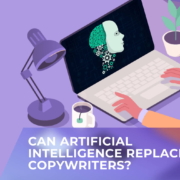Can artificial intelligence replace copywriters?
With the advent of artificial intelligence (AI) tools, content creators and other professionals are increasingly wondering if artificial intelligence can take over their roles. This article focuses on the work of copywriters – specialists who craft various types of written content. We will try to find out how artificial intelligence could affect their work.
Artificial intelligence can serve as an additional source of inspiration.
Copywriters can draw inspiration from a wide variety of sources – their surroundings, the books they read, interactions with people, travel, works of art, etc. Artificial intelligence tools can also be seen as an additional source of inspiration: exploring the versions of text they generate can provide intriguing insights and lead to unexpected but valuable ideas.
Artificial intelligence can support the production of copy that, for whatever reason, does not require extensive preliminary analysis and in-depth research.
Occasionally, copywriters are assigned tasks where creativity does not play a major role. In such cases, a rather formalized approach to producing the required content is considered adequate. Artificial intelligence tools can help generate the desired copy, which can simply be edited or customized later, freeing up time for other tasks.
Artificial intelligence can generate a large amount of text in the shortest possible time.
Indeed, AI tools can generate massive amounts of text within a brief timeframe, and this aspect can be considered advantageous, if the end justifies the means.
Artificial intelligence lacks the capacity for comprehensive research on a given topic.
Artificial intelligence generates output based on its training data. It is unable to analyze specific sources, compare data from different sources, and draw its own conclusions based on analysis. Therefore, we can conclude that, at least at the current stage, artificial intelligence cannot completely replace copywriters.
Artificial intelligence can produce text that may seem generic.
AI-generated copy often comes across as generic, as it is tends to be written in a more formal language and lacks the necessary emotional component. This, of course, is quite understandable. A truly creative person with solid knowledge of a subject can enrich the text with subtle meanings and creative expressions.
Artificial intelligence might not be useful for creating highly specialized text.
Artificial intelligence can generate news copy, press releases, and various informational materials. However, it is not advisable to use such tools to create expert-level articles on highly specialized topics. In times like these, it is important to take a “human-first” approach, which means that the copywriter in question should possess the necessary subject-matter expertise.
Like any tool or solution, artificial intelligence has its advantages and disadvantages. Today, artificial intelligence tools cannot replace human copywriters, but they can assist specialists when used correctly. It is never a good idea to rely entirely on even the most advanced technologies: keep broadening your horizons and strive to gain new and valuable knowledge.
Finally, I would like to note that Janus Worldwide’s specialists follow the “human-first” approach in copywriting: they have great respect for words, and they do not use artificial intelligence in their work.






